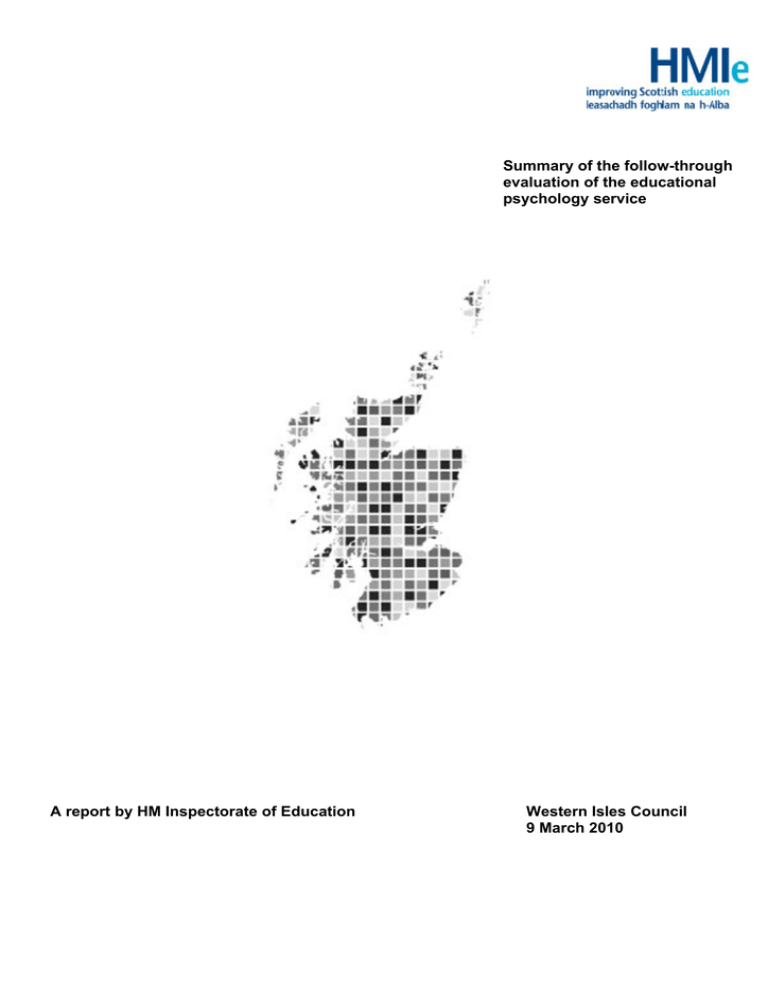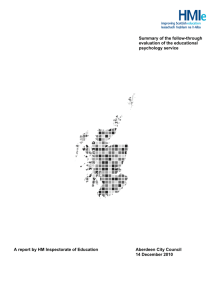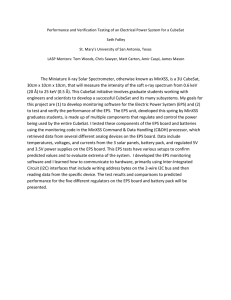Summary of the follow-through evaluation of the educational psychology service
advertisement

Summary of the follow-through evaluation of the educational psychology service A report by HM Inspectorate of Education Western Isles Council 9 March 2010 Contents 1. The inspection 1 2. Continuous improvement 1 3. Progress towards meeting the main points for action 2 4. Conclusion 4 How can you contact us? 1. The Inspection HM Inspectorate of Education (HMIE) published a report on the inspection of Western Isles Educational Psychology Service (EPS) in February 2009. Following the inspection, the service prepared an action plan indicating how it would address the main points for action identified in the original HMIE inspection. HM Inspectors (HMI) revisited the service in November 2009 to assess the extent to which the EPS was continuing to improve the quality of its work, and to evaluate progress made in responding to the main points for action. 2. Continuous improvement Since the original inspection a director of the new Education and Children’s Services (ECS) has been appointed. A structure for ECS has very recently been agreed by elected members. The EPS is now managed by the head of children’s service and is aligned with inclusion staff, principal teachers of learning support (PTLS) and social work services for children. The principal educational psychologist (PEP), educational psychologists (EPs) and senior managers within ECS have a clear agenda for developing the EPS within the new structure. Over the last year, the EPS has been successfully delivering services to the five new learning communities across the authority. The service continues to build on its strengths. EPs are highly motivated to provide, along with a range of partners, effective services to meet the needs of children, young people and families within the Western Isles. The service has further developed high quality consultation and assessment services for parents and young people. For example, effective support is provided to vulnerable young people to help sustain positive destinations post-school. EPs now bring valued experience and expertise to consultation and individual casework that is recognised by a wide range of stakeholders within the learning communities. The service has further developed valued partnership working with a range of stakeholders including health colleagues in the Social Communication Team to improve outcomes for children and families. This includes the delivery of joint training to further improve assessment and planning processes. The service is strengthening engagement with partners in voluntary organisations, the independent sector and community learning and development to address literacy issues in both young people post 16 and adults. The aim is to increase parental confidence in supporting their children’s learning. Direct work with children and families continues to be a strength. Partners in education and beyond report EPs to bring significant skill and expertise to multiagency working. The EPS helps to build capacity in others and impacts on the delivery of services to children and young people. The service has worked along with senior managers and partners to initiate a more structured process of assessment and planning where off island placements may be required. 1 3. Progress towards meeting the main points for action The initial inspection report published in May 2007 identified four main points for action. HMIE confirm that the service has made encouraging progress across the main points for action resulting in a number of improvements for children, young people and families. Systematically involve all stakeholders in service development and improvement activities, particularly with regard to the development of a research programme. The service has engaged with stakeholders including the heads of learning communities, schools and other agencies to increase understanding of EPS roles and service developments. The EPS has now produced a document on Who we are and what we do which has been circulated to all headteachers with comments invited. HMI met with focus groups across three learning communities. Almost all participants were very happy with the quality of the service delivered. Partners commented on the range of skills within the team, the responsiveness of the service and the thoughtful and respectful way in which EPs engage with all stakeholders. The service has taken steps to increase its role in relation to research. The EPS has engaged with stakeholders around post-school psychological services (PSPS) developments to research models for future delivery of services post 16. A paper with recommendations is in draft form and will be used to inform further developments. Research is being undertaken along with Cagliari University to explore language acquisition and bilingualism with Gaelic as a minority language. Some school staff and other stakeholders are more aware of the range of services available from the EPS and are able to talk positively about EPs role in raising their own skill level and confidence in delivering services for children and young people. While schools and partners are still less clear around training and research, senior managers report that EPs are central to developing much of the material delivered by others to schools. This includes promoting positive behaviour, dyspraxia, dyslexia and social communication. EPs help ensure that authority led staff development is targeted at the identified needs of children and young people. EPs have received training in solution focused approaches to therapy and management. Plans are in place for the EPS to work along with managers in ECS to explore ways in which solution focused approaches can support more effective service delivery. The EPS recognises the benefit of working closely within the learning communities to further engage stakeholders in service developments. With the more established learning communities this has already proved to be very effective. The service remains at an early stage in relation to engaging with children, young people and parents in capturing the impact of service engagement. The service now needs to explore meaningful ways of involving children and young people in the development of services to meet their needs. 2 Review and improve policy and planning arrangements to improve the quality and consistency of services delivered across the authority. The EPS has developed a clear and shared identity, philosophy and purpose within the team. EPs are committed to having fortnightly team meetings to improve the quality and consistency of services across the authority. Minutes from these meetings over the last year demonstrate careful consideration of practice issues to best meet the needs of all stakeholders. Team meetings have promoted effective use of peer review and support to allow EPs to consider and evaluate aspects of service delivery on an ongoing basis. Minutes show reflection on policy development to ensure shared understanding around key processes. This has increased consistency of practice. The range of services being delivered across the authority has started to increase with examples of effective direct training and research initiatives being undertaken. The EPS is involved in ongoing dialogue with senior managers in ECS in relation to service developments and will contribute to the new children’s services management team. Staff plan to progress policy and planning along with ECS and learning community developments. The service needs to consider ways in which the policy and practice arrangements can continue to be monitored and reviewed, particularly as individual learning communities develop further and partnership working increases. Ensure that targets for improvement show clearly the intended impact and outcomes for stakeholders, particularly children and young people. The service has drawn together a clear improvement plan based on the original inspection and has delivered on a range of targets within this plan. The plan identifies intended impact and outcomes and is monitored to identify when these have been achieved. The service and senior managers are aware of the positive impact of EPs on children, young people and families. A wide range of stakeholders within learning communities can report on improved outcomes following EPS involvement. EPs do not yet systematically capture this information to inform future developments. The service has yet to establish an improvement plan, linked to wider authority objectives and priorities, that identifies intended impact on children and young people. Both the EPS and senior managers within ECS should consider how the service can plan for improvement and evaluate progress to ensure continuous improvement. 3 Develop a more rigorous approach to self-evaluation involving all stakeholders in service development and improvement. The service has engaged with a range of stakeholders through learning communities to discuss service development and begin to evaluate the services delivered. The EPS has reflected on the plan that emerged from the original inspection to begin to evaluate progress against stated objectives and identify areas for further improvement. The EPS acknowledges that progress in relation to formal and systematic mechanisms for self-evaluation against improvement planning remain at the early stages of development. Since the original inspection the service has prioritised establishing a shared understanding and vision for the service and communicating this consistently to stakeholders. Senior managers report that the EPS will now be included in the ECS planning system linked to the improvement planning and monitoring group. 4. Conclusions The EPS is highly motivated to meet the needs of children and young people and has taken clear steps to build on its strengths and begin to implement the recommendations of the original report of February 2009. The improvements in service focus and development have resulted in greater access to EP services for an increased number of stakeholders across the Western Isles. HMIE will carry out a further visit in a year’s time to review the ways in which the EPS has continued to engage with stakeholders to deliver improved outcomes for children and young people in line with ECS priorities and objectives. Roslyn Redpath HM Inspector 9 March 2010 4 If you would like to find out more about our inspections or get an electronic copy of this report, please go to www.hmie.gov.uk. Please contact us if you want to know how to get the report in a different format, for example, in a translation, or if you wish to comment about any aspect of our inspections. You can contact us at HMIEenquiries@hmie.gsi.gov.uk or write to us at BMCT, HM Inspectorate of Education, Denholm House, Almondvale Business Park, Almondvale Way, Livingston EH54 6GA. Text phone users can contact us on 01506 600 236. This is a service for deaf users. Please do not use this number for voice calls as the line will not connect you to a member of staff. You can find our complaints procedure on our website www.hmie.gov.uk or alternatively you can contact our Complaints Manager, at the address above or by telephoning 01506 600259. Crown Copyright 2010 HM Inspectorate of Education




